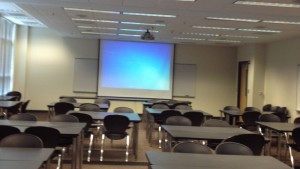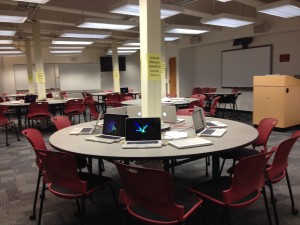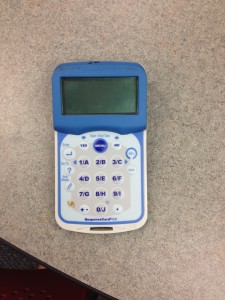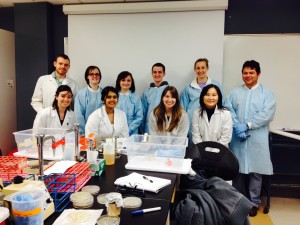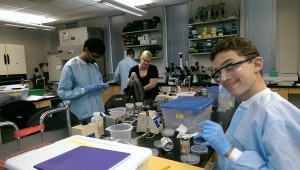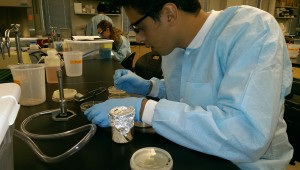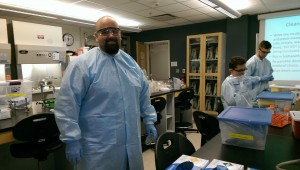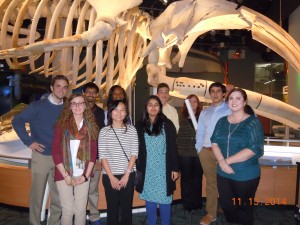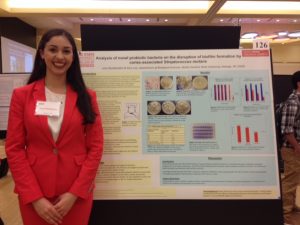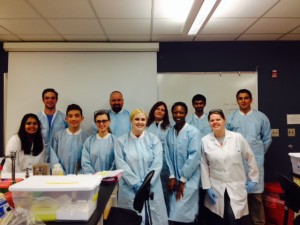Contribution to Teaching Mission
The first sentence of the University’s mission states that, “As a research-extensive land-grant University, North Carolina State University is dedicated to excellent teaching, the creation and application of knowledge, and engagement of public and private partners.” As an Associate Teaching Professor, my focus is dedication to excellent teaching. In the process of pursuing excellence in teaching, I have created and applied new knowledge in my discipline and across disciplines, often engaging in both public and private partners.
Contribution to Undergraduate student education
My teaching role at NC State spans multiple courses: instructor of a large enrollment (> 800 students/year) critical-path course (MB351 General Microbiology lecture), laboratory curriculum developer, lab coordinator (MB352), instructor of Crowdsourcing antibiotic discovery (MB360), instructor of an interdisciplinary science and history course, The Fourth Horseman, Plagues that Changed the world (MB200).
In all of these courses, I am dedicated to excellence in teaching; seeking to develop students into critical thinkers, life-long learners, and problem solvers. Students accomplish this best by actively doing these activities. For example, I engage them in cooperative learning by assigning case studies completed by teams of students. Most of my courses are either directly based on real-world problems or model some aspect of it. In my MB360 course, students are taught the scientific process by working on a real-world problem, that of antibiotic resistance. Their semester-long research project contributes to antibiotic discovery and characterization of local soil microbial diversity. Student research data is crowdsourced with over 250 parallel courses taught around the world.
In the redesigned MB352 Microbiology labs, we work with industry partners, such as the Mt. Olive Pickle Company to address the problem of salt concentration in pickling brines. Student data will be used to inform food safety practices and decrease the environmental impact of salt used in food fermentation processes. In collaboration with microbiology instructors at our partner study abroad institution, Adam Mickiewicz University (AMU) in Poznan, Poland, I have co-instructed our study abroad NC State students using my interactive online lecture course materials.
An interdisciplinary perspective is critical to the development of strong problem-solving skills, engaging in flexible thinking, and being comfortable with ambiguity. My MB200 course builds an interdisciplinary approach to the integrated and in-depth study of select microbial pathogens and their influence on history, public health, and human affairs. Five major pathogens are examined to identify causative agents of disease, modes of transmission, prevention, and treatment. These pathogens are framed in the power of plagues to shape human history and their impact on public health. Students use primary source materials to explore the nature and impact of infectious disease. They learn to develop factual narratives of infectious disease through historical explanation and evaluate how infectious disease shapes human behavior. Students will seek to explain historical perspectives on infectious diseases, and the impacts of epidemics on societies in the past, present, and future. They will also be able to distinguish between the methodologies used to research the causative agent of disease from the methodologies used to study the historical impact of infectious disease. One of the themes will explore and discuss are issues of diversity and representation in history and science.
A teacher must also have the enthusiasm to excite the curiosity of students, engaging them with an enriching learning environment. The use of current events, literature, history, public policies in science, and even humor, are useful tools to stimulate student thinking.
Contribution of Graduate student mentoring
Often, graduate teaching is overlooked; however, it plays a critical role in supporting the teaching mission. Excellent graduate teaching assistants (GTAs) directly affect the quality of education that our undergraduates experience. As a lab coordinator for MB352, another large course (14-16 sections, ~700 students/year), improving GTA’s instruction is critical. I provide consistent mentoring of their teaching and evaluate their instructional practices. All new GTAs receive a personal teaching observation and guidance on a variety of instructional practices. A significant amount of time is spent providing structure and support to GTAs. Resources provided include a shared google drive folder with lecture PowerPoints slides, lab set up documents, and quiz/lab practical questions. In-person support in the form of weekly meetings for pedagogical training, instructional feedback, and how to handle student concerns improve GTA instructional practices.
Contribution to Colleagues
Teaching is never done in isolation. I am dedicated to sharing and disseminating my teaching materials to colleagues in and out of our department. I attend local and national conferences in which I present new teaching projects and assessments. Mentoring colleagues such as instructors from local community colleges and high schools, and with the Small World Initiative (SWI) have enabled me to contribute back to my community. Having a network and community of scientist teachers that are dedicated to excellence in teaching is crucial to advancing new ideas in teaching and learning.
Contribution to University, College, and Department
I have served on various University (CUE), College (UAAC), and Department (Strategic plan, Microbiology curriculum, Peer evaluation of teaching) committees. As a member of the University standing committee’s Council on Undergraduate Education (CUE), I have assisted in the evaluation of University regulations with regard to the General Education Program (GEP) requirements for new and existing GEP courses. These experiences have enriched my understanding of how the University strives to support, improve, and enrich the undergraduate educational experience.
Contribution to Community and Public Service
In several of my courses, I organize and facilitate the venues in which students can present their work to the public. Each fall, my MB360 students present their research to the public at the North Carolina Museum of Natural Sciences, teaching them about the impact of antibiotic resistance. Each spring, my MB351 students develop and teach a microbiology lesson to museum participants in the MicroWorld iLab. We do similar education projects at local High Schools (Trinity School, Research Triangle High School) and Middle schools (Goldsboro Middle) outreach programs on and off campus. This semester I am a co-faculty advisor to the Microbiology club. I have facilitated guest speakers, field trips, and an epidemiological research project at the North Carolina State Fair regarding prevention of disease transmission at the Fair. These public and private partnerships have been an excellent learning experience on how to interact with local communities.
Contribution to Discipline
An important aspect of our University mission is the creation and application of knowledge. Course redesign projects have enabled me to be engaged in active educational research. We have developed a learning environment questionnaire (LEQ) that evaluates student’s perception of the learning environment. Student academic success is predicated by more than disciplinary instruction; it is becoming more apparent that the learning environment plays a key role in their persistence. In addition, our students have contributed to the creation of new knowledge through the authentic-research courses that we have developed. The MB352 labs are redesigned with private partners (Mt. Olive Pickle Company) to bring real-world research questions that students can answer. A curriculum paper based on this redesign was recently submitted to a peer-reviewed journal. The M360 course engages a public partner, the Small World Initiative (SWI), where one of the goals is for student-driven discovery of new antibiotics from the soil environment. Students in my fall 2016 MB360 course won the SWI-CDC (Centers for Disease Control) Do Something about Antibiotics Challenge for their public outreach efforts. Last summer, I drove them down to the CDC for a private tour and mentoring session with the lead CDC epidemiologist.
Reflections on Teaching
My personal goals are to continue to be passionate about teaching, and learning about teaching, from both my students and colleagues. I also aspire to design my courses to be relevant to students, rigorous, and engaging. Creating this kind of environment keeps me motivated and enable students to be active participants in their learning.
The best part of being at a University is the students and faculty that I get to work with.
Teaching Images:

